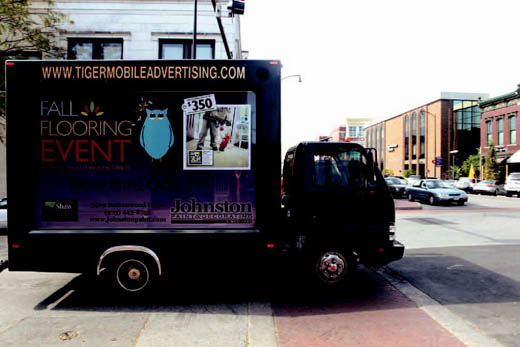Council members pursue ban on advertising truck
October 29, 2010

For the past two months, TW Auto has been in the rotation of advertisements displayed on a truck owned by Tiger Mobile Advertising. The truck has 6-foot-by-10-foot ads on its side panels and a 6-foot-by-6-foot ad on its back panel. The ads, covered by clear plastic panes, are on a mechanized scroll and change every seven seconds.
The truck is driven around Columbia during the day, and the routes include multiple trips along Stadium Boulevard, Providence Road and Broadway.
The base rate for running an ad is $650 per month, according to Tiger Mobile Advertising’s website. The company says that 72,207 people will view the ad per month.
“Our method of advertising generates double the attention of static billboards,” the website states.
The advertising truck certainly has gotten the attention of Paul Sturtz, the City Council’s 1st Ward representative.
Sturtz wants to find a way to ban the unusual advertising method, which he calls “road spam” and believes is “very distracting” to drivers.
“They can be a danger in that they can cause accidents because their messages are constantly scrolling through,” Sturtz said. “They cause unnecessary traffic and are just an unnecessary source of pollution as they go around and around the block.”
Sturtz asked for a report from the city attorney, Fred Boeckmann, on the legality of the mobile advertising.
The report concluded that though the truck is arguably a portable sign and a billboard that might be a violation of the sign ordinance, the same can be said of city buses and commercial trucks that display advertisements.
Sturtz said the advertisements on this truck differ from advertisements on the side of buses because buses have another purpose “beyond getting our attention.”
“These are just pollution-causing eyesores,” the councilman said. “It’s a movement all around the country to ban them, and I think Columbia should be on the bandwagon. There’s a reason why they’re so unpopular.”
On Oct. 4, the Council passed a motion to ask for the Planning and Zoning Commission’s recommendation on the issue.
Tiger Mobile Advertising owner Collin Bartels said his legal counsel advised him not to talk to the media about the situation.
The city’s ordinance prohibits portable signs, which are defined as signs “not designed or manufactured to be permanently anchored or affixed to the ground, building or other structure.” The prohibited signs include those “affixed to a trailer or other portable structure,” according to Boeckmann’s report submitted to the Council.
The ordinance also bans animated signs, which are defined as those “with action or motion, flashing or color changes, requiring electrical energy, electronic or manufactured sources of supply,” and billboards, which are “off-premise signs.”
Sturtz acknowledges that the truck Tiger Mobile Advertising is using is not expressly forbidden.
“There’s seemingly a loophole in the present sign ordinance that allows people to put these large blinking signs right inside their windows,” Sturtz said, referring to the panes covering the truck ads and the front windows of some local commercial buildings that have blinking signs behind them. “This is against the spirit of the ordinance, what some of these businesses are doing, and I think that it’s presently unregulated because it’s not explicitly banned.”
But Rollie Bartels, owner of the two Tiger Express Washes in Columbia and Collin Bartels’ father, said when he first heard about the truck, he thought it was a good idea.
“We started it June 1, and we’ve since seen a drastic increase in our sales,” Rollie Bartels said. He added that he and his business partner would not use his son’s service if it didn’t work. “It has to be a win-win, or we wouldn’t do it,” he said.
Rollie Bartels has advertised in the Add Sheet, Door-Mail and a little on television, he said, but the advertising truck has been by far the most successful.
“It’s what I can afford,” said Bartels, whose businesses employ 32 people. “I can’t afford TV or radio because it’s very expensive. In today’s economic times, my business is based on volume. I can’t raise prices.”

“The City Council tries to get involved in things that I think are beyond the scope of the City Council,” Schranck said.
Schranck said the truck was “a stupid thing to be worried about.”
“It’s no more distracting than a city bus or a taxi,” Schranck said. “I don’t think that one single truck produces enough pollution to merit the city deciding they’re going to ban it.”
Schranck, who has advertised with Tiger Mobile Advertising for two months, said he figured the truck was an inexpensive way to increase name recognition, but he has not decided whether he will renew his contract next month.
Sturtz said the next move would be to tweak the existing ordinance.
“It just needs to be tinkered with a little bit to control what people drafting the ordinance probably didn’t see happening, which was that these billboards were going to go on wheels and going to be going around the blocks downtown,” Sturtz said.
California has made several moves to ban mobile billboards, as they’re officially called, from being parked on public streets. The California Assembly voted in April to ban parked mobile billboards, and Gov. Schwarzenegger signed a bill allowing cities to pass local ordinances banning them. Chicago, New York, Boston and Austin, Texas, have also banned mobile advertisements.
The Austin ordinance cites safety, pollution and aesthetic reasons for banning mobile billboards. It defines a mobile billboard as “a sign installed or displayed on a vehicle operating in the public right-of-way for the purpose of advertising a business or entity that is unrelated to the owner of the vehicle’s primary business.”
However, the definition excludes non-motorized vehicles, buses, taxis or a vehicle operating in the normal course of the owner’s business.


